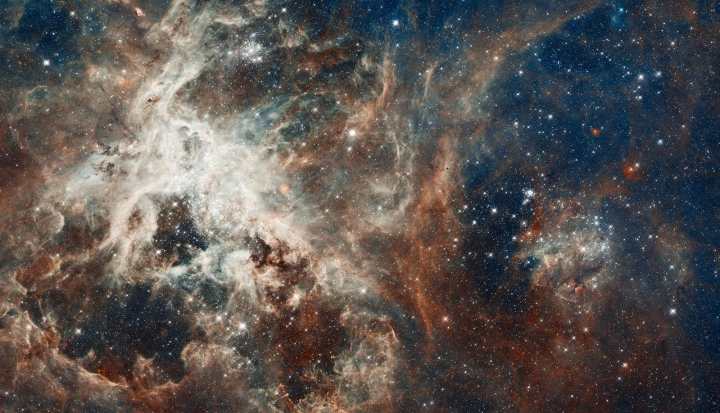As a priest and an astronomer, Jesuit Father George Coyne bridges the worlds of faith and science, but he’s quick to acknowledge that they serve two different purposes. “I can’t know if there is a God or if there is not a God by science,” he says.
At the same time the emeritus director of the Vatican Observatory sees no conflict between scientific and religious knowledge, though he admits that the church has not always agreed. But even in the famous case of the astronomer Galileo, there were issues other than science at stake, notably who could interpret the Bible. “Galileo was never given a chance to talk about his science,” Coyne says. “Galileo knew how to interpret scripture, but he did it privately.” The Council of Trent had forbidden private interpretation 70 years before in response to the Reformation.
Still, says Coyne, Galileo pointed the way to a happier relationship between faith and science. “Galileo anticipated by four centuries what the church would finally say about the interpretation of scripture,” argues Coyne. “Galileo said that scripture was written to teach us how to go to heaven, not how the heavens go.”
For his own part, Coyne finds in science an invitation to explore. “The universe is dynamic. We don’t know totally where it is going,” he says. “Does that limit God? Does that minimize God? I don’t think so. I think it glorifies God.”
Give us some amazing facts about the universe that would enrich a Catholic understanding of faith.
The universe understood scientifically is an amazing challenge to both science and to religious faith. The scientific facts about the universe are very well established. First the universe is 13.7 billion years old. A billion is a one with nine zeroes behind it, so that’s a lot of years. Second, it contains 10,000 billion billion stars. That’s a one with 22 zeroes behind it.
We know the age of the universe by its expansion: Galaxies are all moving away from us. There is a very tight relationship between their distance from us and their speed. Namely, the farther away an object is, the faster it is going. If you’re two times farther away from me, you’re going away four times faster. If you’re four times farther away from me, you’re going away 16 times faster. It holds for every galaxy in the whole universe.
When we measure the age of the universe by its expansion, we discover that the universe began to expand 13.7 billion years ago, plus or minus 200 million years. It’s an amazing measurement.
How do we count all those stars?
When the Hubble telescope takes a photograph of the most distant part of the universe we can see, it produces an image called the Hubble Deep Field. The image has millions of dots of light, and every one of those dots of light is a galaxy. Hubble concentrated on a very small part of the sky, one-twentieth of the thickness of my index finger held at arm’s length. So you have a million galaxies in this little piece of the sky. What if we measured the whole sky? By multiplying all that together you get 100 billion galaxies, each of which contains, on the average, 200 billion stars.
What’s so important about that?
Now I’m getting into the religious implications. How did we come to be in this universe? The classical question is: Did this happen by chance, or was it necessary that we would come to be?
The question is a scientific question at first. Was it by chance or by necessity? We know the processes. The answer, according to modern science, is that it’s both: chance and necessity in a fertile universe.
What do you mean by a “fertile universe”?
A star lives, so to speak, by a thermonuclear furnace at its center, created by the collapse of gas that raises the temperature to millions of degrees. The furnace converts hydrogen to helium. If the star has enough mass, it will collapse again, raise the temperature even higher, and convert helium to carbon, carbon to nitrogen, and so on. As a star lives, depending on its mass, it converts lighter elements into heavier elements. When it dies, it spews out these elements to the universe.
When a generation of stars dies, a new generation is formed from that gas, which is no longer just hydrogen but is enriched with helium, carbon, silicon, nitrogen, even iron. Our sun is a third-generation star. If it were not, we wouldn’t be here.
We needed three generations of stars to get a star that could furnish the elements for life. That’s what I mean by the fertility of the universe, that through physical processes in the universe, we’re building up the chemistry until we have the chemistry for life.
What about chance and necessity?
Over 14 billion years with all these stars pouring out all this chemistry, imagine what has been happening.
The universe has a structure to it. It has laws of nature. When two hydrogen atoms meet, they have to make a hydrogen molecule. But sometimes they don’t because the temperature and pressure conditions are not correct.
So they wander throughout the universe and meet trillions of times. There are trillions of hydrogen atoms doing this. It shouldn’t surprise us when, by chance, two atoms meet at a time when the temperature and pressure conditions are correct, and they make a hydrogen molecule.
That’s “chance,” but it is also more than just chance. The two hydrogen atoms have to make a hydrogen molecule if they meet with the correct conditions. We can put a probability on that. Around some stars it’s more probable because the temperature conditions are different. In some galaxies it’s more probable. It’s a combination of chance and necessity, but in a fertile universe there are many possibilities for this to happen.
With all this chemistry available over 14 billion years, chance and necessity work together to build up ever more complex molecules. You get proteins, amino acids and sugars, DNA, livers, hearts, and eventually the human brain through biological evolution.
How does God fit into that?
We know the scientific process that brought us to be. But a religious believer then asks, “Did God do it, since it seems to have a structured evolution toward a human being?”
Did God do it? Speaking as a scientist, my answer is: I don’t know. There’s no way I can know scientifically if God did it. I can be amazed that there is this movement to ever more complex, more adapted organisms, including human beings. But to me as a scientist the human being is a complex biological organism. I can’t talk about the spiritual character of the human being.
I can get evidence of it. But I can’t talk about it as a scientist, and I can’t talk about God as a scientist. If I try, I’m not doing science. I think it’s very important in modern society, certainly in modern America, not to confuse what we know from science with what we know from philosophy, theology, literature, and music.
Human culture is vast, and science is an important part of human culture. But it’s not everything.
I believe that God created the universe, and because I believe that God created the universe, I think it is valid for me as a scientist to say, “I know what the universe is like. What kind of God would make a universe like this?”
How do you answer that question?
It’s a marvelous God to my mind. In creating the universe, God did not make a washing machine or a car. God made something dynamic.
Creation has an evolutionary character to it. There is chance involved. This God didn’t make something predetermined. We don’t know completely where it’s going, even scientifically. We can’t predict everything.
Is God omnipotent? Is God omniscient as I was taught? Would God be able to know at the beginning of the universe that I was going to be born?
To respect the science, I have to say no, because God cannot know what’s not knowable. Since there are chance processes involved, it’s not completely knowable according to science. Does that limit God? Does that minimize God? I don’t think so. It glorifies God: God did not want to have something that was completely predetermined.
That God sounds different from many common understandings.
Whenever we talk about God, we’re babbling. We’re doing our best from what we know. God is not just an object that we talk about and think about and pray to. God is the source of everything, of all knowledge. But I do insist that our knowledge of God should respect our knowledge of the universe and of ourselves in the universe. That’s a challenge, but it’s a happy challenge.
I believe that God is omniscient and omnipotent. But then I have to think about what I’m saying and ask, “What do I mean by that?” I surely mean that God is all-powerful, but can God do anything God wants to do? The universe appears to me to not allow that, but it’s because God wanted the universe to be the way it is.
Why do some believers want to ignore or reject scientific knowledge?
It’s not so much they’re ignorant from the point of view of what science knows or ignorant from the point of view of what religious faith is. They don’t want to face the challenge of putting them together. But there’s no conflict—a challenge, yes. But I can’t see that there ever could be any conflict between true religious faith and true science.
Then why do faith and science seem to be at loggerheads?
Because of you journalists! I’m only kidding, but some journalists really do seem to want to stir the pot.
One problem is scientists who claim they’re practicing science when they either assert or deny God’s presence. They’re stepping outside science.
I get into trouble when I say it, but atheism is a practice of faith. An atheist cannot prove to me there is no God. The evidence we have through all of human history documents people’s deep-rooted belief in God.
Some scientists will say we’re all being duped, but that is not reasonable. Science is a rational process. It’s using our intelligence to try and understand the universe, as is philosophy, as is theology, by the way. It’s an attempt to understand.
Faith goes beyond reason, but it doesn’t contradict reason. I’m thoroughly convinced of that, not just in my own life, but in the reality of what religious faith is and what human reason can accomplish.
Most of the scientists I know who are atheists are deeply respectful of human faith. The ones that aren’t don’t understand it. The evolutionary biologist Richard Dawkins, who wrote The God Delusion (Houghton Mifflin Harcourt), and the theoretical physicist Stephen Hawking, who wrote A Brief History of Time (Bantam), are both eminent scientists. But they don’t understand what religious faith is. I’ve had conversations with both, and I’ve said that to them. They respect me because they realize that I’m an objective, working scientist just as they are.
What are they missing?
Stephen Hawking’s concept of God is that God is something we need to explain parts of the universe we don’t understand. I tell him, “Stephen, I’m sorry, but God is a God of love. He’s not a being I haul in to explain things when I can’t explain them myself.”
I once said to Richard Dawkins, “Richard, why did you marry the lady you married? Because she has blue eyes, paints her toenails red, has curly hair?” When you put all the facts together in general human experience—not just religious experience—you can’t explain it all rationally. Human experience has a nonrational character. That doesn’t make it irrational. You’re not crazy—you may be crazy in love—but all that means is that you can’t explain everything.
When you pray, does it make any difference that the universe has 10,000 billion billion stars?
Absolutely. When I pray to God, it’s a totally different God than I prayed to as a kid. The God that I pray to now is a God who not only made me but brought me to be in a universe that is dynamic and creative. The universe is not itself a living being, but it is a universe that has thus far given birth to human beings who can pray to God.
I pray to a God that, from my scientific knowledge, has made a universe in which people have come to be and are still coming to be, even from a scientific perspective. The universe is continuing to expand. Just in the past 50 years, look at what the human being has come to be. I’m talking about technology.
When I was growing up we had no television. Now you have one in your pocket. That is a development of the human being. Technology is an extension of ourselves.
Is there anything special about us in this enormous universe?
We are very special to God, and there’s no doubt about it. I mean, God sent his only Son to us. Being special as a piece of material in the universe is one thing; being special in knowing religious history and living a faith-filled life is another. But it’s still a challenge.
As material objects in the universe, it would be difficult for me as a scientist to defend that we’re special. Our history as human civilization certainly makes us special. But what if there is another civilization out there that is intelligent and spiritual, that has a special relationship to God? What would that do to us?
I’m going to leave that to theologians. But could God send his only-begotten Son, true God and true man, to become true God and true Martian, or whatever it is? Well, I find that very difficult to accept. But I can’t exclude it. I don’t know enough to exclude it, and I can’t limit God.
This is getting into science fiction, but in the end if God treated another spiritual civilization in a very special way, does that detract from his treating us in a very special way, however he dealt with them in the concrete?
I’m one of 10 kids. If my mother decided to buy me a new pair of pants, does that make my brother less special to my mother? I can’t imagine that discovering an intelligent, spiritual civilization that God loves in his own way would detract from God loving us.
This article appeared in the February 2012 issue of U.S. Catholic (Vol. 77, No. 2, pages 18–21).
Image: Flickr cc via NASA Goddard Space Flight Center












Add comment